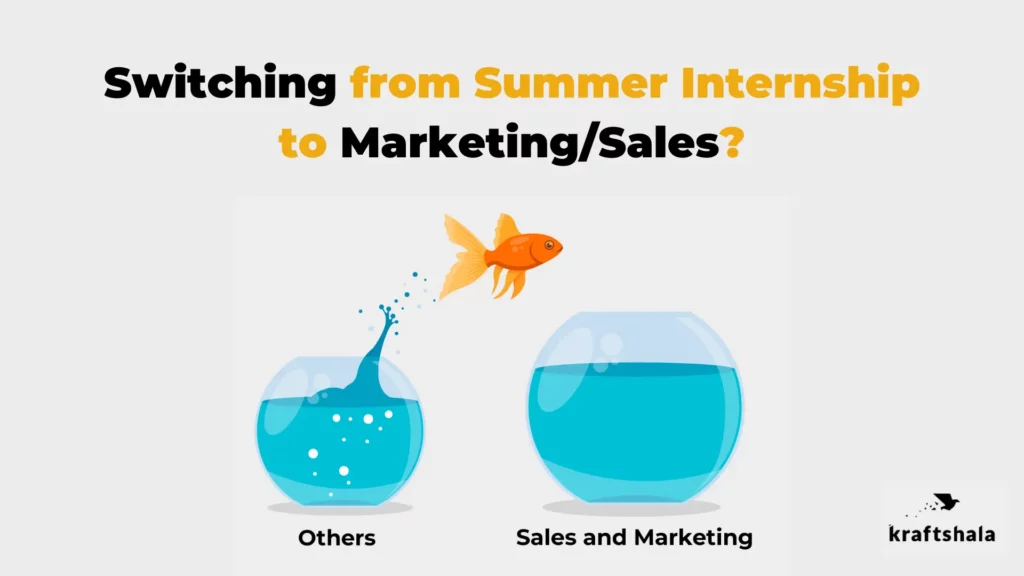
Summer Internships have finally concluded in B-Schools across the country. However, in just a few months, the atmosphere across campuses shall become tense again as the final placements approach. While the final placements can be a stressful period for even those with the ‘perfect’ CV, others might have to face a different set of challenges. You might have dreamed of building a career in marketing but landing a dream sales and marketing job is contingent upon several factors and not all of them are in your direct control.
Take Surabhi Tripathi for instance, a 2014 pass out from IIM Kozhikode. Surabhi had a prior experience of 40 months in an IT major. She had entered the MBA program with the intention of building a career in marketing. However, after getting repeatedly short-listed for IT roles and being overlooked for S&M ones during her summers, she realized that her CV would require a substantial rework to bag a final placement in a sales and marketing role.
Or take the case of Sujoy, a 2014 pass out from FMS, Delhi, who after his under-graduation in Economics from St. Xavier’s College, ended up interning at a finance firm during summers. It was only towards the end of his internship that he realized that he actually wanted to build a career in sales and marketing. However, with such a finance-heavy profile, how does one make the switch?
And these are just two cases. In B-Schools across India, there are candidates who are eager to build their career in sales and marketing but don’t have the background or the CV suitable for it. Surabhi and Sujoy today are successful marketing professionals in prestigious companies. While Sujoy presently works at HUL in the homecare division, Surabhi works with the market research team at ITC. Their stories highlight how they overcame their challenges to build a career they wanted and how you could do the same.
Several interesting insights emerge out of their stories. “The key is to make your CV more marketing oriented by filling the gaps. There will always be things like your prior work experience and grades that you can’t change. However, apart from these two sections, the rest is in your hands” – says Surabhi. Not having enough marketing related points on her CV and having work experience in IT domain, Surabhi went about in a structured manner to reframe her CV by recognizing four areas she could work on – Projects, Case Study Competitions, Roles and Responsibilities, and Courses and Certifications. She then systematically scouted for marketing projects and courses she could take to strengthen her credentials in addition to successfully competing in several case study competitions.
Sujoy, on the other hand, did not have work experience but being from an economics background, he always thought he was destined for a finance career. Though he was fascinated by marketing and eagerly attended the guest lectures, but did not think of it as a career. In fact, even his summer internship was in a finance role. However, towards the end of his internship, he began to realize that he didn’t really enjoy the finance role as much as he thought he would. After reaching out to several alumni of his college and looking at their career progression, he finally made a decision to switch over to marketing.
There was, however, one problem – his CV screamed finance. How was he to convince the recruiters that although he under graduated in economics and did his summers at a finance firm, he would do well in a marketing career? Sujoy identified three major stumbling blocks in his way to a marketing career – getting shortlists for S&M roles with a finance heavy CV, intense competition from peers with almost half the batch having Marketing as a major, and the lack of sufficient subject knowledge. Sujoy focussed on case study competitions to bolster his marketing credentials while simultaneously investing a lot of time and effort in bridging the knowledge gap with his classmates.
Some common themes emerge as we analyse these stories. Firstly, the paramount importance of case study competitions in building credibility. Recruiters know the amount of time, effort and skill it takes to crack a national level competition. Doing well here is a very strong signal as to your seriousness and passion towards marketing as a career option. In fact, companies have started looking at case study competitions as a recruitment channel with a high ROI. Spend a few lakh rupees and you’ll have the cream of top B-Schools across the country working hard to come up with solutions to real-world business problems. HUL Lime, RB Mavericks, and ITC Interrobang are a few competitions that give you the opportunity of a direct PPI or a PPO.
Surabhi has a piece of sobering advice here though – “Don’t participate in every competition that comes your way. Focus on just a few and aim to crack them. Often people spread their efforts too thin and get frustrated with poor results”. Very often, winning case study competitions may not help you in getting shortlists but they definitely provide a lot to talk about in your personal interviews. Marketing courses and workshops are also a great way to not only improve your knowledge of the subject matter but add CV points that may drive your personal interviews.
Apart from the standard Google certifications for Analytics and Adwords, try to complete Hubspot courses for content and inbound marketing as well. Unlike Finance and Operations where industry standard certifications like CFA and Six-Sigma are available, marketing didn’t have a parallel certification. Kraftshala’s IndustryCredsTM certifications in Digital Brand Building , Sales Leadership and Brand Building fill in that gap now and are designed to set a benchmark for measuring the students’ marketing and sales acumen.
Your aim as you prepare for placements should not be only getting many shortlists but being confident of cracking any opportunity that comes your way. Here, nothing can help you but an in-depth understanding of the subject. ‘Read as much as possible’ was the mantra Sujoy followed. Read from your textbooks, sites like afaqs.com and adage.com, case studies, and any and everything you can find. If you are really made for marketing, this would not seem like an effort at all. Working on short-term projects is also a great way of bolstering the practical aspects of your knowledge and a good CV point as well.
To conclude, evaluate your strengths and weaknesses carefully and go about filling the gaps in your CV in a systematic manner. Remember that bit about signalling from Microeconomics class? A good brand and profile in summers is indeed a positive signal about your S&M skills, but there are multiple other ways to send that signal as well. Now it’s up to you to find your own way.
This article was written by Ajay Jadhav from IIM Raipur with inputs from Surabhi Tripathi and Sujoy.
Check out our courses











